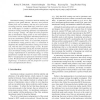Free Online Productivity Tools
i2Speak
i2Symbol
i2OCR
iTex2Img
iWeb2Print
iWeb2Shot
i2Type
iPdf2Split
iPdf2Merge
i2Bopomofo
i2Arabic
i2Style
i2Image
i2PDF
iLatex2Rtf
Sci2ools
ICDCSW
2006
IEEE
2006
IEEE
Interdomain Routing as Social Choice
Interdomain routing is essential to both the stability and efficiency of the global Internet. However, most previous studies focus only on stability, and only on a special class of routing protocols, namely BGP-type, path-vector protocols. In this paper, we conduct a systematic analysis of interdomain routing considering optimality and implementation in strategic settings. We adopt the novel perspective that an interdomain routing system is one which defines a social choice rule that aggregates individual preferences of all of the autonomous systems (ASes) in a network to select interdomain routes with a set of desirable properties. An interdomain routing protocol, then, is a mechanism to implement the identified interdomain routing social choice rule, when the ASes can adopt strategic actions. By pointing out the incompatibility among the desirable properties of an interdomain routing system and the requirements for strategic implementation in distributed settings, we reveal funda...
Distributed And Parallel Computing | ICDCSW 2006 | Interdomain Routing | Interdomain Routing Protocol | Routing Protocol |
| Added | 11 Jun 2010 |
| Updated | 11 Jun 2010 |
| Type | Conference |
| Year | 2006 |
| Where | ICDCSW |
| Authors | Ronny Ramzi Dakdouk, Semih Salihoglu, Hao Wang, Haiyong Xie 0002, Yang Richard Yang |
Comments (0)

